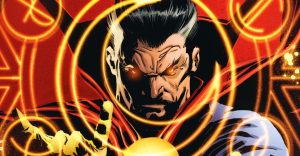How Assassin’s Creed Valhalla Could Have Improved Asgard

In a series where mystical elements are nothing new, Assassin’s Creed Valhalla didn’t quite capitalize on the potential of its Norse mythos. Mythology has been a key element in the current Assassin’s Creed “trilogy,” and while it was an important part of Valhalla, it wasn’t fully taken advantage of.
Assassin’s Creed Valhalla’s trips to Asgard and Jotunheim have a pretty decent story attached to them. In an effort to better understand her visions, Eivor consults with a seer and drinks potions that “transport” her mind to the mythological Nordic realms. Eivor then experiences a vision from the perspective of Odin, featuring Gods who share strong resemblances with the main characters of the game’s overarching story. There are fairly interesting implications that are directly related to Assassin’s Creed Valhalla‘s ending, but that’s really all there is for players in these realms.
One of the best changes in Assassin’s Creed Valhalla was the way points of interest were marked on the map, particularly the wealth opportunities. These wealth spots mark where players can find valuable loot in the form of gear, money and resources. But in the realms of Asgard and Jotunheim, these locations only contain generic collectibles whose only value are skill points, which the game already features an over-abundance of. Players are able to wield Thor’s hammer and Odin’s spear in this game, but neither has anything to do with the actual realms of the Gods. It would make these realms feel infinitely better if players could craft Thor’s armor with the dwarves in Asgard, allowing them to lift Mjolnir in the real world, as opposed to looting Assassin’s Creed Valhalla gear in arbitrary locations. And it would make way more sense to obtain Gungnir by completing the Asgard story, considering Eivor is experiencing everything from the perspective of Odin, as opposed to just pulling it out of a rock in Norway. These realms just aren’t worth exploring and it’s a huge missed opportunity.
Why Assassin’s Creed Odyssey’s Mythological Content Was Better

While the handling of mythological content in Assassin’s Creed Odyssey wasn’t universally loved by fans, it was much better than what Assassin’s Creed Valhalla did. In Odyssey, players traveled to simulations of Elysium, Atlantis, and the Underworld, where Kassandra was able to interact with the Greek Gods, acquire enhanced abilities, and find gear that was closely associated with their respective realms. And because they’re mythological realms, it allowed for the developers to get really creative in bringing these incredible locations to life. But Valhalla doesn’t reward players for exploring them in the same way that Odyssey does, and they’re largely wasted.
The Assassin’s Creed series has a really interesting mix going on between actual history and the sci-fi Isu race that allows for a lot of creativity, and it’s disappointing that Assassin’s Creed Valhalla misses the mark. Norse mythology isn’t nearly as common as the Greek Pantheon, but it’s every bit as interesting and it’s gained a lot of momentum in recent years. Assassin’s Creed Valhalla will continue to dabble on the mythical side of things with its upcoming Wrath of the Druids DLC, set in Ireland, but it’s hard to imagine that anything will be done to substantially improve on the elements of Norse mythology, and that’s a shame.
About The Author

















